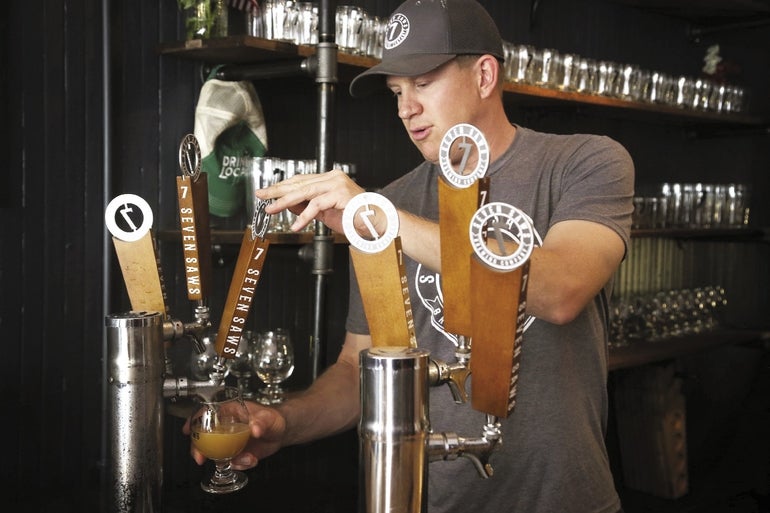Alcohol industry in flux as retailers and corporate interests vie for policy changes
 PHOTO/ARIANA AUBUCHON
Tom Anderson, co-founder of Seven Saws Brewing in Holden, pours a beer at the brewery.
PHOTO/ARIANA AUBUCHON
Tom Anderson, co-founder of Seven Saws Brewing in Holden, pours a beer at the brewery.
The retail side of the alcoholic beverage industry in Massachusetts is in a "pretty chaotic" place as corporate interests vie for greater control of the marketplace here while COVID-19 restrictions recede and businesses and consumers alike adjust to changes in the industry, the head of the Massachusetts Package Stores Association said Monday.
Rob Mellion told the Joint Committee on Consumer Protection and Professional Licensure that the 17 bills he wanted to discuss during Monday's hearing were a demonstration of the upheaval in his industry.
"But this 17 is part of about 100 bills that are being weighed before you throughout this legislative session. I have talked about, on a number of occasions I've explained this, that the motivation behind a lot of these bills is driven by a push by large corporate interests towards marketplace control, as well as the opportunity to do so. COVID-19 has provided an opportunity to do so," he said. "It is in this context that we are working towards preventing further disruption, further securing of marketplace control by large corporate interests, for the benefit of all the small businesses in the state."
Just before Mellion got his turn to offer testimony Monday, the committee heard from Edward Cooper, vice president for public affairs and community relations at Total Wine & More, a national package store chain that operates six locations around Massachusetts. Cooper focused his testimony on two bills that he said were "pro-consumer" -- H 379 to allow retailer-backed coupons for alcohol and H 422 to allow package stores to open on Thanksgiving.
He said retailers have discretion over price adjustments on alcohol above the wholesale cost and that both wholesaler- and producer-backed product-specific coupons and rebates are allowed. Retailers in Massachusetts cannot issue their own coupons or rebates, but Cooper said H 379 filed by Rep. Ken Gordon would allow for coupons while maintaining the state's prohibition on selling alcohol below cost.
"You may hear today that there are some alcohol and beverage retailers that stand opposed to providing customers with coupons and loyalty programs, and that's certainly their prerogative. We hope as a matter of policy that the committee would support giving retailers that option to provide these benefits to consumers," he told the committee. "Massachusetts consumers will be overwhelming winners on retailer-backed coupons. It allows retailers to differentiate on price and compete for customer loyalty. When retailers compete, the customer benefits."
In 2017, Total Wine & More launched a campaign to rally consumers behind their proposals to update the Massachusetts laws governing the sale of beer, wine and spirits. Loosening restrictions on selling alcohol at discounted rates and allowing alcohol retailers to offer coupons or loyalty programs were among the company's proposed changes, which were presented to an Alcohol Task Force assembled by Treasurer Deborah Goldberg. The task force did not include the company's proposals among its recommendations.
Mellion said his organization, which represents thousands of independently-owned retail liquor stores in Massachusetts, has long opposed the idea of retailer-backed coupons.
"This is a tool for large, out-of-state corporate interests to be able to take over marketplace control in the state," he said.
He similarly dismissed the idea that package stores need to be allowed to open on Thanksgiving.
"I assure you that no local retailer of beer, wine and spirits wants to be open on Thanksgiving," Mellion said. "This is something that the large corporate interests want to do so that they can attract customers to their stores away from the small businesses."
Cooper said allowing liquor stores to open on Thanksgiving is a matter of convenience for customers, "many of whom either have left the shopping needs to the last minute or forgotten to pick up something on their way to family dinner."
Mellion said that Massachusetts used to prohibit package store sales on Memorial Day, but began allowing liquor stores to sell alcohol after noon on Memorial Day with the passage of a 2016 law. He said Thanksgiving sales "will be very hurtful, just like Memorial Day."
"Memorial Day sales have been hurtful. That is something that no retailer ever wanted, but it was put through as an amendment to an economic bill," he said. "Nobody saw it coming and it created great harm in our industry."
Though the differing opinions offered by Cooper and Mellion took up most of the short hearing the Joint Committee on Consumer Protection held Monday afternoon, Mellion and the Massachusetts Restaurant Association found common ground on a bill (H 436) that would allow alcohol sellers to rely on identification issued by another state as sufficient proof of a person's identity and age.
Sellers can currently accept an out-of-state ID, but only Massachusetts IDs, passports and military cards offer defense against liability for selling to a minor.
"To our knowledge, Massachusetts is the only state in the country that refuses to recognize out-of-state licenses as a valid form of identification. Even a notoriously prohibitionist state such as Utah allows out-of-state ID and we even have inconsistencies in our own world as out-of-state identification is accepted in for cannabis but out-of-state ID is not accepted for alcohol purchases," Stephen Clark, vice president of government affairs for the Mass. Restaurant Association, said.
He added, "We take passports from Denmark, Russia, every other part of the world. We don't take a license from Rhode Island."









0 Comments